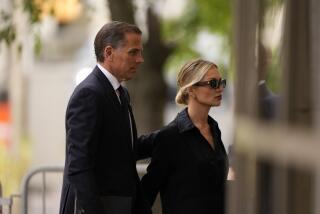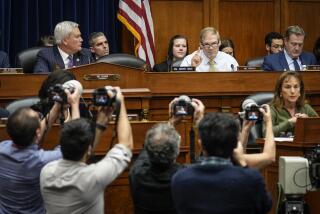Abortion Fight Drives Hyde’s Prosecution
- Share via
The unimaginable is happening. The impeachment train has left the station, and while the engineer may look like a genial geezer, he’s as determined as they come and bound for glory. You can almost hear him cackling with delight as he plows through the opposition, forcing them to scatter.
If the train makes it to the Senate, as now seems likely, Henry J. Hyde, chairman of the House Judiciary Committee, will assume his role as the constitutionally designated prosecutor of the president with whom he has long been at odds.
But the animosity isn’t over the original charges of Whitewater. Hyde was involved in his own expensive savings and loan scandal as a paid director of Clyde Federal, which cost the taxpayers $67 million in bailout money.
And given the recent revelations of Hyde’s own adulterous affair when he was Bill Clinton’s age, it is not likely that he is shocked by the president’s adolescent behavior. Hyde, despite frequent professions of his Catholic faith, carried on a sexual affair for five years with a married mother of three, which led to the breakup of the woman’s family.
It also is difficult to believe that he is truly outraged, as he claimed last week, over Clinton’s possible violations of “the rule of law.” This is the same Hyde who was Oliver North’s most virulent defender during Congress’ investigation of Iran-Contra, who believed fervently that it was a mistake to “label every untruth and every deception an outrage.”
Back then, he was willing to excuse the Reagan administration’s violation of the law: “It just seems to me too simplistic” to condemn all lying, and “In the murkier grayness of the real world, choices must often be made.” He condemned the Iran-Contra investigation as a “disconcerting and distasteful whiff of moralism and institutional self-righteousness” and “a witch hunt.” It takes one to know one.
Indeed, when it comes to his most fervently felt cause, the identification of abortion with murder, Hyde has even argued that some laws are made to be broken. Last April, Hyde testified as a character witness at the civil trial of Joseph Scheidler, who was accused of orchestrating blockades against abortion clinics. “He’s a hero to me,” said Hyde of Scheidler, “He has the guts I wish more of us had.”
When asked on cross-examination if he could vouch for the character of a man who may be breaking the law, Hyde replied, “Absolutely, if the law of the land is immoral and condones the killing of children.” In his testimony, Hyde drew an analogy between the work of abortion clinics and the horrors of the Holocaust. In an interview with the Chicago Sun-Times, Hyde explained, “I am trying to analogize an abortion clinic, where people are destroyed by intention, with the death camps. The analogy fits in my judgment.” Despite Hyde’s testimony, the jury awarded damages against Scheidler’s organization to two clinics under the Racketeer Influenced and Corrupt Organizations Act.
Hyde has a score to settle with the president, and it’s about the one issue that has defined his political life since his freshman year in the House in 1976, when he first attached to appropriations legislation an amendment banning federal funding for abortions.
The Hyde Amendment had continuing support from GOP presidents, but with the election of Clinton in 1992, Hyde was forced to accept compromise language that would allow federal funds to be used for abortions in cases involving rape and incest. But emboldened by the Republican House victory in 1994, Hyde went back to his original absolutist position: “Rape is horrible. The only thing worse than rape is abortion. That’s killing.”
This is not the place to debate such extreme views but merely to note that anyone who thinks about abortion in such stark terms is bound to have a particular animus toward a president who has been consistent on that one issue and maybe only that one issue.
Unfortunately for Hyde, the pro-choice voters carried the day in 1996 in reelecting Clinton. But it would hardly be startling to discover that Hyde is now using the president’s problems to reverse the electorate’s judgment.
And don’t expect him to be worried about what the polls show, or the fact that some moderate Republicans, most from districts carried by Clinton, might get wiped out in the next election. Those moderates are most often pro-choice, so their defeat is really no loss to this charming zealot.
More to Read
Get the L.A. Times Politics newsletter
Deeply reported insights into legislation, politics and policy from Sacramento, Washington and beyond. In your inbox twice per week.
You may occasionally receive promotional content from the Los Angeles Times.










